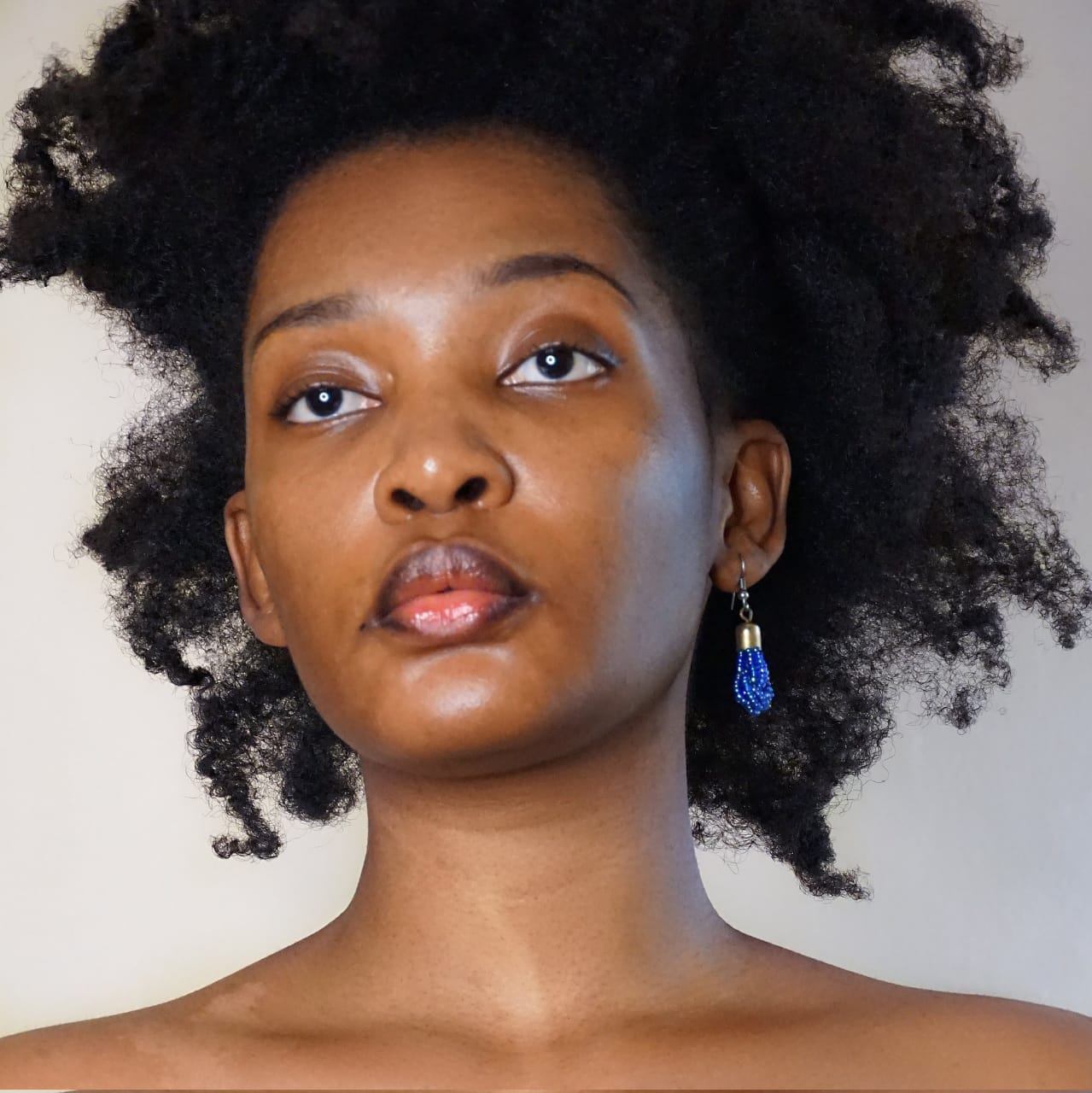Interview by Frank Njugi (Kenya)
Edited by Lise Kiberwa (Rwanda)
1. Hello Mapenzi. It is a pleasure talking to you. You are someone who wears many artistic hats; the principal ones being that you paint and curate a literary festival. How would you describe your artistic journey and how did you come to be involved in all these creative pursuits?
Hey, Frank. I’m honoured that you thought about doing this. A few years back I saw this clip of an artist being interviewed, it was on a local news channel. Guess what she said got her into painting? Same as my genesis, grief. She too had lost her mom. It was sometime back and I was pretty young, still boiling with rage at having my mum, my light, my one friend taken away from me, from this world, and at the hands of people she knew. Well anyway, I would also say that it started with a cereal box. One night, while struggling to force dinner down, I peeped at this lion illustration on the back of said cereal box, and then I grabbed a pencil and paper, the rest is history. As for my love for reading, I read ‘Who Moved My Cheese’ back in primary 4 and fell in love with words. The book shaped my outlook greatly. Again, it was my mum’s copy so… I guess we can say she’s at the heart of my creative pursuits (culinary and fashion too).
2. Your endeavours mostly seem to incline towards promoting the works of other creatives rather than your artistic works. What attracts you to this selflessness? What inspires you to do this?
Well, I am not in any way a writer so, I wouldn’t call it selflessness. However, that’s not to say that I just blindly share (usually through retweets) any African literature that I come across, no. For the many years, I have been into reading, it had mostly been Western works. Back in primary school, a certain English teacher got me to loathe pacesetters (which I now love after rediscovering them without the pressure of a caning session upon failure to complete them within several hours). So western books were all I knew until I met this writer (Alvin Kathembe) one afternoon back in 2021. I read one of his works soon after, and I got hungry, no, ravenous, for more Afro literature. Such beautifully arranged words. That was poetry and all I can say is that no words can explain how it makes me feel. I figured there are probably more Africans like me out there, who have not discovered the treasure waiting between the pages of African books.
Read – Existing as a Young Creative In Africa: A Conversation with Muhammed Olowonjoyin
3. Would you say literary creatives require curators such as yourself for there to be an advancement of their art? If so why is this?
How do I put this? What I have done is hardly a drop in the ocean but I’m glad to witness the shift; more Kenyans are reading the right books. Anyway, more effort should be invested into properly supporting and compensating this art form because the writers are really good! Their work should cover bills and offer early retirement options, so they can write more, of course.
4. Poetry love fest is one of East Africa’s premier literary festivals that solely involves poetry. What prompted you to curate such an event and how come you leaned towards poetry?
I would say that the lack prompted the need. That lack was revealed by Church of Poetry on Twitter mainly. First time I listened in on that space, Kwaku Kyereh was reading a poem and my eyes closed of their own volition. The words soothed me in ways I’d never experienced, it felt like they tugged at new tendons in my soul (souls don’t have tendons, but that day, hearing poetry being read put them there). Life caused interruptions for several months as it’s known to do but when I got back on the space, I asked myself where in Nairobi one could experience such a session, in person. I Google my way through life, so that’s what I did, and, zilch. Search didn’t throw up anything like what I was looking for so I and my two strands of courage put out a tweet about wanting to start this festival purely to celebrate African poetry, seeking advice and well, the rest was history.
5. When you curated this avenue (poetry love fest) are there any challenges you noticed that Literary creatives go through that you wanted to alleviate? If so which ones were they and how do you aim to use your festival to mitigate these challenges?
The biggest challenge I would say is funding because other avenues such as literary journals are there. Look for instance at DRR doing a fantastic job. Writers need to be paid. Printing costs money. Those whose words are being printed, require money. Money! Therefore this coming month, I’m looking to seek sponsorships that will hopefully go a long way towards helping this. And to help feed people too (anyone).
6. In your ‘Poem a Day in Translation’ episode where you translate Clifton Gachagua’s Poem Promenade, you say about it “What excites me about the poem is how every time I read it, I want to read it out loud. It demands to be heard, whilst obstinately remaining an enigma. And every time I read it out loud, the cadence of the hues of the words, the mini worlds each sentence forms, the shape of the feelings it evokes, they keep morphing, like I’m reading it for the very first time”.
Does this describe the kind of poetry you have an affinity for? Poetry that nudges your soul and demands to be recited with valour. If yes, why is this so?
Definitely. By the way I said I’m not a writer so, don’t expect me to be good at expression through words, but this poem embodies everything I like in a poem. As I say ‘a poem that demands something when you read it.’
Read – Literature as a Tool for Advocacy: A Conversation with Naomi Waweru
7. Which literary artists have you encountered in your endeavours whose works you admire?
Oh my goodness! Michael Onsando. This man’s ‘The Perilous Journey to Beyond My Nose‘ poetry book took me there. The guy can write! I am in awe every time, every single time I dare recall the feelings his words evoked; the worlds he created in that book and in my mind. His work takes you on such a spiritual, introspective journey. There are other impressive literary artists of course, but I’ll take this chance to highlight Onsando.
8. What should we expect from you in future concerning your endeavours of promoting literary creatives?
There is a saying that goes like “no expectations, no disappointments”. All I can say is, Poetry Love Fest is for Africans, and that’s where you will find us, in Africa, loving and celebrating African literature, in African nations.

Mapenzi Karisa is an artisan, Culinary & Fashion creative, living and working in Nairobi. She is also the curator of the Literary festival – Poetry Love Fest’.







